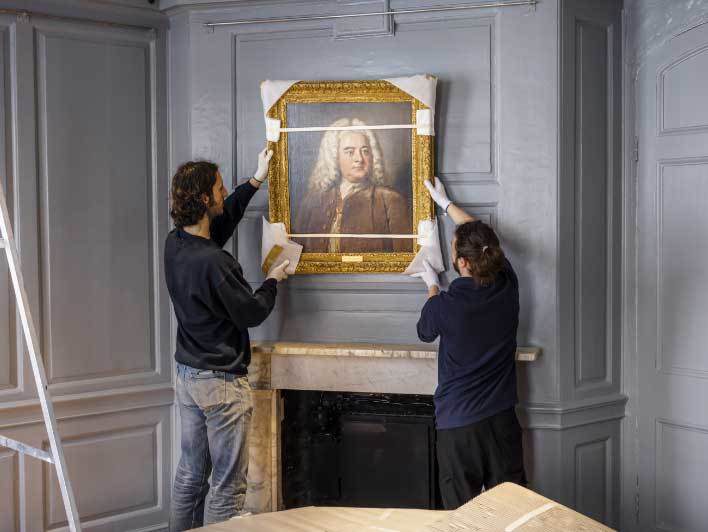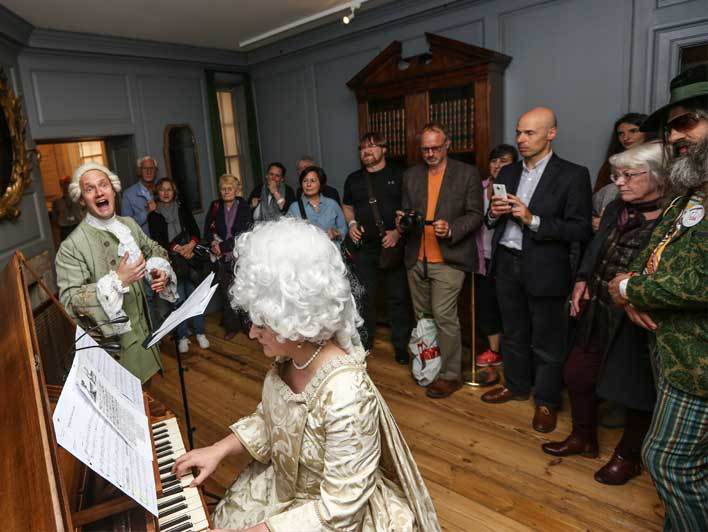ARIANNA IN CRETA (HWV 32)
Libretto: Unknown, after Pietro Pariati, 1721/9
First performance: 26th January 1734, King's Theatre, London
Cast
- Anna Maria Strada del Pò (Soprano)
- Giovanni Carestini, called "Cusanino" (Alto-castrato)
- Maria Caterina Negri (Contralto)
- Carlo Scalzi (Soprano-castrato)
- Margherita Durastanti (Soprano)
- Gustavus Waltz (Bass)

Synopsis
Many years before the action of the opera, King Minos of Crete waged war on the Athenians and their King Aegeus for having killed his son and abducted his baby daughter. The daughter, however, was brought up by King Archeus of Thebes, an ally of Athens, as his own child. Peace was established with an agreement that every seven years Athens should send as a tribute to Crete seven young Athenian men to be ritually sacrificed, and seven Athenian maidens to be delivered as victims to the Minotaur, a monster (half bull and half man) that lives in the Cretan labyrinth. The requirement for the tribute will be ended only when a hero kills the Minotaur and defeats the Cretan champion Tauride. The time of the third tribute has come, and Teseo, son of King Aegeus, has accompanied the Athenian party to follow his beloved Arianna, who has been called to Crete as surety for the delivery of the tribute.
Act I
The sea-shore of Crete, with a great stone on which the terms of the Athenian tribute are inscribed. The Athenians disembark. Teseo presents them to King Minos, and asks for the release of Arianna. Minos agrees. Tauride reads the terms of the tribute from the stone, but as he does so it shatters, and cupids (symbolising the triumph of love) fly over it. Arianna recognises her friend Carilda among the young women. Tauride, appointed to guard the victims, is struck by Carilda’s beauty. He warns Teseo to be fearful of him. Teseo and Arianna try to comfort Carilda, not realising that her distress is due more to her secret love for Teseo rather than her expected fate. Teseo tells Arianna that he is determined to slay the Minotaur, making her afraid for his life. He is met by Alceste, who has learnt that his beloved Carilda is to be one of the Minotaur’s victims. He thinks it is his duty to save her, but Teseo assures him that he is best suited to the task. Alceste nevertheless believes he will still be her saviour.
A courtyard leading to the temple of Jupiter. Carilda rejects unwelcome advances from Tauride. As Minos arrives with his attendants he notices Alceste and asks who he is. On hearing that he is a Greek, he orders him to draw from an urn the name of the first Athenian maiden to be sent to the Minotaur. Alceste finds he has chosen Carilda, but he secretly assures her that she will be saved. Left alone with her guards, Carilda regrets that she cannot return Alceste’s love, because she loves only Teseo. Minos returns, and accepts Teseo’s offer to go in place of Carilda (thus giving him access to the labyrinth). Distressed and not understanding Teseo’s purpose, Arianna suspects that he has fallen in love with Carilda, but he assures her that he is faithful. Left alone, Arianna finds rage and love at war within her heart.

Act II
A wood, with the temple of Hercules in the distance. Teseo reflects on his dilemma: to comfort Arianna, or to continue with his plan to kill the monster. He falls asleep. The God of Sleep appears in a cloud, presenting a vision of Teseo’s destiny. As the vision vanishes, Teseo suddenly wakens from a dream of fighting the Minotaur, his doubts resolved. Alceste appears, now suspecting that Teseo is in love with Carilda. Teseo assures him that Arianna is his only love. He tells Alceste the secret of her birth which he has learnt from his father – that she is the daughter of Minos – and says he is determined to marry her and end the conflict between Athens and Crete. Alceste tells Arianna that Teseo will not be dissuaded from his plan, and implies that it is love for Carilda that is inspiring him. Arianna is distraught, but her love for Teseo remains firm.
In a conversation overheard by Arianna, Minos warns Tauride that Teseo is a worthy champion, but Tauride reminds him that Teseo cannot succeed without knowing the secret obstacles that he must overcome: the Minotaur must be pierced through the throat; the labyrinth must be navigated by means of a thread; and Tauride is protected by a magic belt. Arianna leaves to pass this information to Teseo, while Tauride boasts of his valour.
Carilda, still under guard, is brought in. Tauride tries to abduct her, but is dismissed by Arianna. The two women converse at cross-purposes: Carilda talks of the Athenian who loves her, meaning Alceste, but Arianna assumes she means Teseo. She nevertheless assures Carilda she will help her, and Carilda asks her to tell Teseo that she is grateful to him for saving her. When Teseo appears, Arianna accuses him of being a treacherous liar, having learnt ‘the secret’ (meaning Teseo’s supposed love for Carilda) from Alceste. Teseo however assumes that Alceste has told Arianna of her true parentage, and that she hates him for being the son of Aegeus, her real father’s enemy. Despite her resentment, Arianna gives Teseo a paper on which she has written what he must do to be victorious. He therefore remains confident of her love.
A courtyard before the gate of the labyrinth. Tauride makes another attempt to abduct Carilda, warning her she must marry him or die. She is met by Alceste, who begs her to escape with him, comparing himself to a friendly guide helping a traveller. They leave, and sounds of clashing weapons are heard as Alceste overcomes the guards. Arianna and Teseo re-appear. Arianna tells him to join Carilda in Athens while she returns to her native Thebes. Teseo thus realises that Arianna is still unaware of her origins, but he cannot now understand her accusations. Minos enters, enraged that Carilda has escaped. Tauride reports that two of the Cretan guards have been killed. Teseo and Arianna are accused of the crime, and Minos orders Arianna to take Carilda’s place in the labyrinth. He claims he acts justly. Teseo, still intent on his plan, remains silent, to Arianna’s distress. Left alone, she laments her fate.

Act III
Within the labyrinth. Carilda learns from Alceste that Teseo truly loves Arianna, and is thus her rival in love, whom she is unlikely to displace. She now begins to feel some pity for Alceste. He is delighted at the hint of a change of heart.
A dark passage inside the labyrinth, appointed for the victims of the Minotaur. Teseo, guided by the thread, has reached the part of the labyrinth where the monster has its lair. He confronts it, and kills it by thrusting his sword through its throat. As he comes away, he is met by Arianna, believing she is to be a victim of the monster. Teseo tells her that he has killed it, and will now take on Tauride. He assures her of his love, and she, though still doubtful, is placated.
A courtyard in the royal palace. Despite Teseo’s triumph over the Minotaur, Tauride confidently prepares to meet him in combat. Teseo however strips him of his magic belt and swiftly overcomes him. Minos announces that the Athenian tribute is no longer required. Teseo asks him for his consent to marry Arianna. Minos says he is willing, if her father is, and Teseo then reveals that Minos is her true father, to his and Arianna’s delight. Arianna and Teseo rejoice in their newly assured happiness.
A royal hall. Before the people of Crete, Arianna and Teseo pledge their mutual faith, and Carilda accepts Alceste as her husband. Teseo leads the final celebration of love and peace.
(c)Anthony Hicks
Context
On the night of 29th December 1733 a new opera company gave its first performance in London. The plans begun in January of that year to create an Italian opera company to rival Handel’s had finally been realised, and a new opera by Nicola Porpora was premiered. Arianna in Nasso launched the Opera of the Nobility at the Lincolns Inn Fields Theatre, originally under the patronage of Frederick, Prince of Wales and seen by many as a direct challenge not only to Handel, but to the prince’s father King George II who was so loyal to Handel. Senesino, Handel’s leading castrato for the previous eight years, who had created new roles in thirteen of his operas, led the cast. He was joined by Farinelli, the most famous castrato in Europe, who Handel had previously tried, and failed, to engage. In April 1734 they would be joined by another of Handel’s early singers, Francesca Cuzzoni.
Only Ana Maria Strada del Pò remained loyal to Handel, and he rewarded her with the leading role in his next opera, Arianna in Creta. After the experimental nature of Orlando Handel returned to the more regular conventions of opera seria, retaining the structures of the da capo arias, and providing opportunities for vocal display by his new cast. For Carestini, Senesino’s replacement, he wrote the role of Teseo in his former heroic style. And there was a surprising return of Margherita Durastanti, who had performed in many of Handel’s early works in Italy and was a member of his original London company. After a nine year absence she returned with a voice now lowered from soprano to mezzo.
Handel opened his 1733-1734 season with a series of pasticcios and a revival of Ottone, allowing his new company to settle in before testing them with his new work. It is tempting to speculate that he chose an episode in the life of Ariadne as a direct challenge to Porpora’s Arianna in Nassos. Handel’s Ariadne ran for a respectable sixteen performances, interrupted briefly by Easter and three revival performances of the oratorio Deborah. He composed no new oratorios for this season, preferring to concentrate on re-establishing his Italian operas in the face of direct competition.
Despite the pressure he must have been under, Handel found time to relax with friends. In a letter of 12th April 1734 Mary Pendarves, Handel’s neighbour in Brook Street, was able to report on a charming party held at her house:
‘I had Lady Rich and her daughter, Lady Cath. Hanmer and her husband, Mr. and Mrs. Percival, Sir John Stanley and my brother, Mrs. Donellan, Strada and Mr. Coot. Lord Shaftesbury begged of Mr. Percival to bring him, and being a profess’d friend of Mr. Handel (who was here also) was admitted; I never was so well entertained at an opera! Mr. Handel was in the best humour in the world, and played lessons and accompanied Strada and all the ladies that sang from seven o’clock till eleven. I gave them tea and coffee, and about half an hour after nine had a salver brought in of chocolate, mulled white wine and biscuits. Everybody was easy and seemed pleased…’


